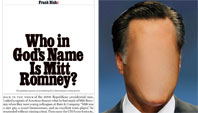
1. “We don’t know who Romney is for the simple reason that he never reveals who he is,” Frank Rich wrote in an essay on the strange void at the center of the Republican presidential candidate’s public image (“Who in God’s Name Is Mitt Romney?,” February 6). “Rich nailed it,” wrote a commenter on nymag.com. “Romney doesn’t want to talk about Bain, he doesn’t want to talk about his governorship, he doesn’t want to talk about his wealth or his father, he doesn’t want to talk about his faith, he barely wants to talk about his family. My God, how are we supposed to vote for someone who will not reveal anything about himself?” We’re not, implied another: “Bottom line is, Mitt is aghast at real discussion about vulture capitalism at Bain. He also doesn’t want you to talk about his signature accomplishment as Massachusetts governor, Romneycare. There is really nothing left to talk about but his Mormonism.” But other readers argued we should worry less about Romney’s being evasive about his faith than about the press tarring and feathering him for it. “As an Obama supporter I am surprised by the shallowness of the statements criticizing Romney’s appearance, personality, and religion … Good looks and a clean-cut [image] do not make a person empty-headed or a robot,” wrote one. “This ‘Romney is weird’ strategy may work all the way to the end, but it will continually have to overshadow the fact that he’s actually very smart and well educated, and he worked in management consulting successfully,” added another. “Lastly, he was elected a Republican in a very Democratic state and achieved a landmark health-care bill no other state has come close to achieving … So I can see why Rich wants to pretend those things aren’t the facts and focus on weirdness and religion—that’s the best they’ve got. And why isn’t it refreshing that he doesn’t want to spend all his time talking about his religion? Obama rightfully didn’t want to spend tons of time talking about his either. Isn’t it actually okay to leave religion out of it?”

2. A cover story on the new economics of celebrity detailed all the strange ways stars make money, from appearance fees to weight-loss endorsements, and all the incredible ways they spend it, from annual plastic surgery to $100,000 stylists for their 6-year-old kids (“Fame: A P&L,” February 6). “So basically, famous people do nothing and get paid for it. Glad we were able to clear that one up,” jeered Jeremy Feist at PopBytes, who found the survey of stars’ wealth both familiar and infuriating. Others took a slightly more nuanced view of the celebrity-industrial complex. “Before being consumed with jealousy that you’re not in on the schwag-a-thon, it’s worth considering that not everything is given to celebrities,” wrote Brad Tuttle at Time magazine’s Moneyland blog. “A summary of one A-list actor’s expenditures reveals that she (or he) spent $11.4 million last year.” And donated very little to charity, as several readers noted: “Oh you made $15 million last year and donated $25K. You are a bastion of generous … nope can’t even type that,” joked BuzzFeed. But before getting outraged about stars’ finances, Dodai Stewart wrote at Jezebel, it might be worth thinking about who’s really responsible for those paydays. “What we should remember is that, in a way, the stars work for us: The movie tickets and albums we buy have an effect on their income. So the next time you’re in Hollywood, be sure to knock on J.Lo’s door and ask if you can swim a few laps in her pool. After all, you paid for it.”
One correction: In “How Much Per Tweet?,” it should have been noted that CVS is not among the companies that have paid Kim Kardashian to endorse products on Twitter.
Send correspondence to: nymletters@nymag.com.